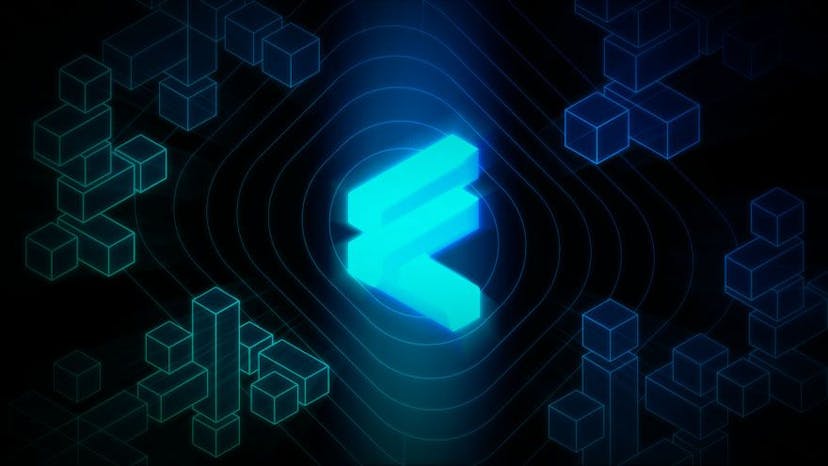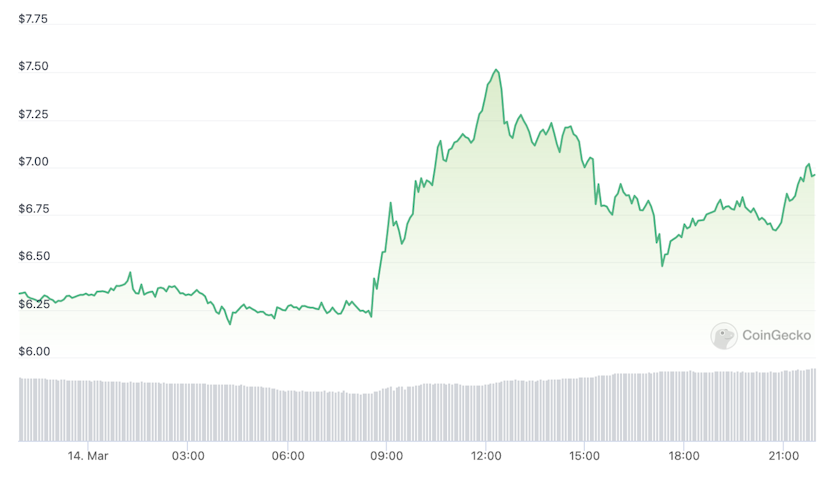Filecoin Launches Ethereum-compatible Smart Contracts
Update Enables DeFi, ‘Data DAOs’ and Perpetual Storage
By: Aleksandar Gilbert • Loading...
DeFi
Filecoin, a blockchain built to store data, has enabled Ethereum-style smart contracts, the final step in its “master plan” to disrupt Amazon Web Services and other legacy cloud computing and data storage platforms.
Filecoin’s FIL token, one of the top 30 by market capitalization, rallied 20% on the news, to a three-week high of $7.51.

FIL Price. Source: Coingecko
“Before that [Filecoin Virtual Machine] upgrade, really all you could do on Filecoin was store data and retrieve it,” Sami Kassab, an analyst at Messari, told The Defiant. “But essentially what the FVM does now is it kind of turns Filecoin into Ethereum, where any type of decentralized application can be deployed on it.”
The Filecoin Virtual Machine is compatible with Ethereum, meaning existing Ethereum applications can be brought to Filecoin without major code modifications. Popular Ethereum applications set to debut on Filecoin include Sushi, Ankr and Axelar.
Ethereum is limited in how much data it can store. It can record NFT ownership, for example, but storing the NFT itself on-chain is prohibitively expensive.
“Typically on-chain, it would just point to [Inter-Planetary File System] or Arweave or Filecoin, where that data is being stored,” Kassab said.
Decentralized Storage
Filecoin matches anyone with excess space, from data centers to people with a couple of extra gigabytes on their hard drive, with those who need cloud storage. Storage providers are to Filecoin what miners are to Bitcoin: they reach consensus on information stored by the network and receive compensation in FIL tokens.
The project raised funding in 2017 from around 150 investors, including Sequoia Capital, Andreessen Horowitz, Union Square Ventures and Winklevoss Capital, who were able to buy the token at $0.75. It raised another $200M at an ICO limited to accredited investors, who were able to buy the token for between $1 and $6.
Bringing smart contracts to Filecoin will enable new uses of the blockchain.
Data DAOs — decentralized organizations that are “centered around an important dataset or curation of important data the community wants” — and on-chain analysis of that data can create new opportunities for scientists, according to Sarah Thiam, a developer advocate at Protocol Labs, the company behind Filecoin.
A perpetual storage feature will make it possible to ensure the existence of certain data as long as the blockchain exists, even if the owner of that data fails to pay their storage provider.
“You’re going to have a smart contract that continuously looks out for renewal of the deal,” Thiam said.
NFT.storage, for example, offers perpetual storage of NFTs, “so that your NFT will live forever — truly, truly forever,” she added.
DeFi on Filecoin
Smart contracts will also bring the first decentralized finance applications to Filecoin.
Studying Filecoin, “I realized how much FIL storage providers need to post [required] collateral, and a lot of times they don’t have access to this large supply,” Kassab said. That forces them to turn to centralized third-party lenders.
“But now they can just do this all trustlessly on-chain, so this enables users holding FIL, to stake it and generate yield by lending it out to some of these storage providers.”
In short, it turns Filecoin into a true marketplace for data storage, he continued.
“It just makes the whole network more economically sustainable, because if you’re bringing over users who now want to come and mint NFTs on the platform, which wasn’t possible before, now you’re just increasing the amount of revenue that the protocol is generating.”
Advertisement
Get the best of The Defiant directly in your inbox 💌
Know what matters in Web3 with The Defiant Daily newsletter, every weekday
90k+ investors informed every day. Unsubscribe anytime.